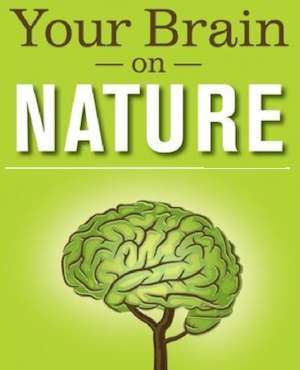Do you want to be happier, healthier, and smarter? I have just the prescription for you: add a daily dose of nature to your routine.
Over the past decade, researchers from fields as diverse as biology, psychiatry, engineering, horticulture, neuroscience and medicine have realized what most of us know intuitively: nature is good for our health and wellbeing.
These experts have discovered countless links between time spent outdoors and cognitive, physical, and emotional improvement. Studies show that enjoying a natural setting — like a park, beach, wetland, or forest — can reduce blood pressure, anxiety, and stress levels. Exposure to nature can help you sleep well and increase vigor and liveliness. It can even boost your immune system.
(It sounds like a doctor's prescription with no side effects, and no cost.)
In their new book Your Brain on Nature, naturopath Alan Logan and Harvard physician Eva Selhub cite dozens of studies that demonstrate the health benefits of the natural world.
They even refer to outdoor physical activity as "exercise squared" because it can increase energy and fitness levels while reducing fatigue, depression, and obesity.
She suggests that time spent with flora and fauna is essential for healthy psychological and physical development in children. In a recent Docs Talk column she points to studies that show daily doses of "green time" can be used to prevent and treat conditions like attention deficit hyperactivity disorder, hypertension, and diabetes.
Ailments like myopia, asthma, and depression have also been linked to inadequate nature exposure.
While this scientific body of evidence is fascinating and growing quickly, most of us remain unaware of the full range of health benefits that nature provides. And with more than 80 percent of Canadians now living in urban settings, many of us lack a meaningful, regular connection with the natural environment that sustains us.
Getting in touch with the outdoors has another great benefit: those who know and love nature work harder to protect it. This is why the David Suzuki Foundation launched its first ever 30×30 Challenge on June 1, inviting people to spend at least 30 minutes in nature each day for 30 days.
By encouraging people to get a regular dose of fresh air we hope to help participants take advantage of the many health benefits nature has to offer. They might even make it part of their continuing daily practice.
With the busy lives that many of us lead, taking time to get outside may seem difficult. But it's easier than you think.
Green space is as close as your local park or backyard garden. Trails, ravines, and community gardens are often a short distance from the daily grind. And birds, bees, and other critters are usually nearby; you just have to take time to slow down, breathe, watch and listen.
Another idea for getting your daily dose of nature: Ditch the indoor gym and go for a run or walk in a park or on a trail instead.
Use your lunch break to get out of the office and visit a nearby green space. Find a nice leafy tree and read a book in the shade. Brush off your green thumb and spruce up your garden.
For the young at heart, a British organization called the National Trust has put together a list of 50 outdoor adventures all children should have before they are 12. The list, found at the Daily Mail, boasts the joys of rolling down a big hill, eating an apple picked fresh from a tree, and hunting for bugs.
The 30×30 Challenge at DavidSuzuki.org challenges you to incorporate small natural diversions into your daily routine for a month. Add some green to your commute, lunch break, workout schedule, or playtime. And remember, a daily dose of nature is good for your head, heart, and health.
(Find out more at www.davidsuzuki.org)










Be the first to comment